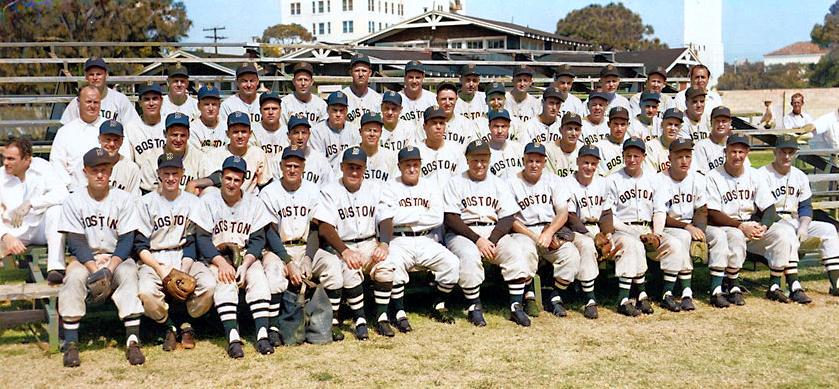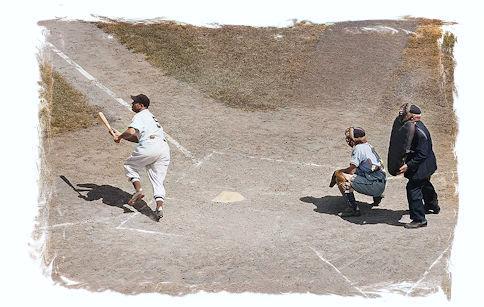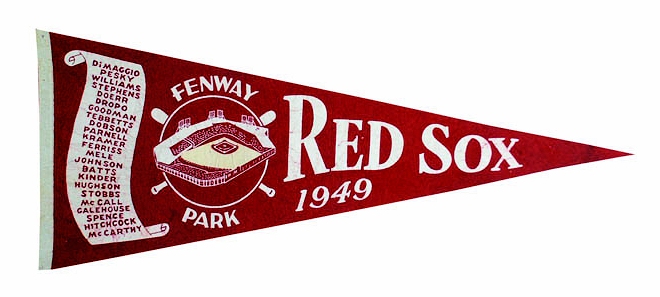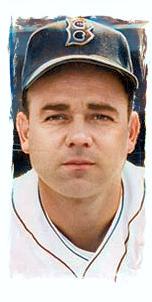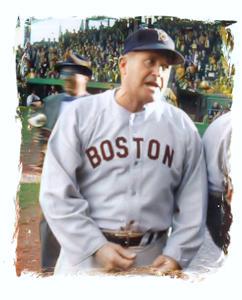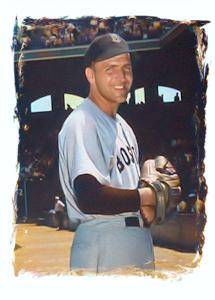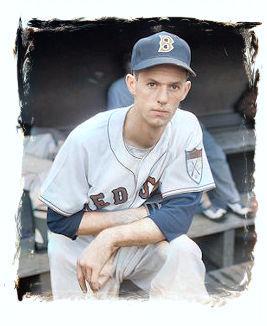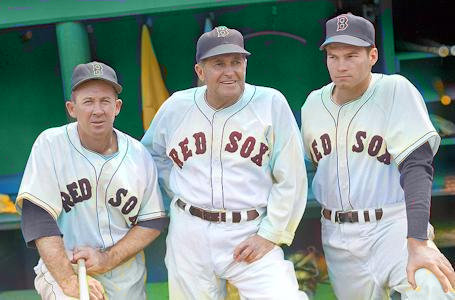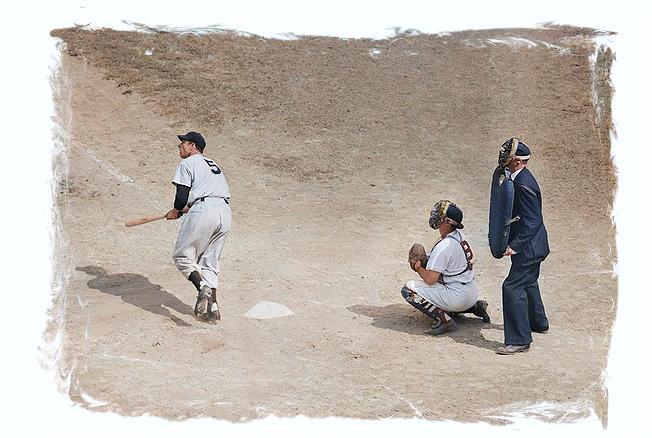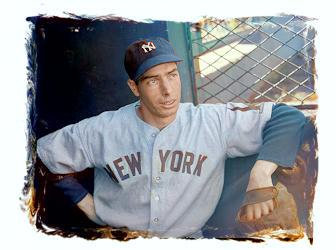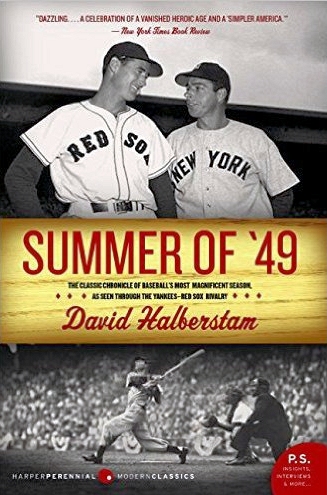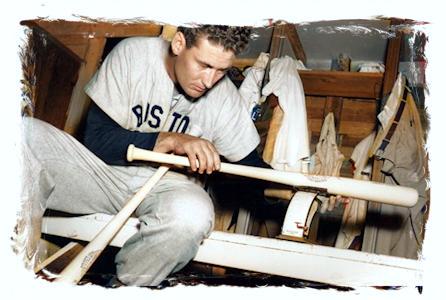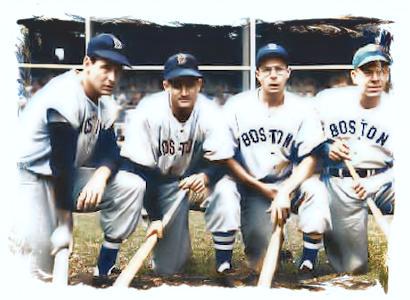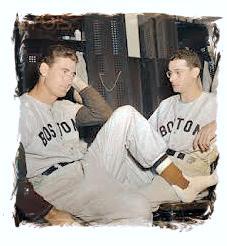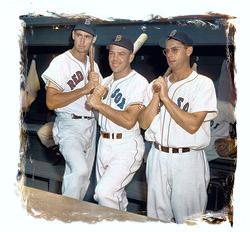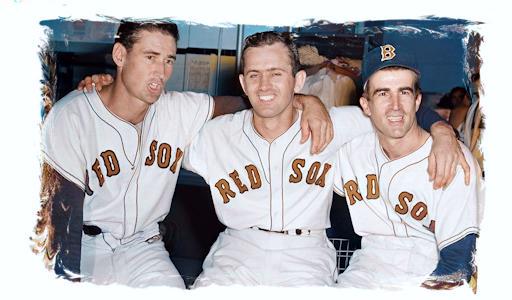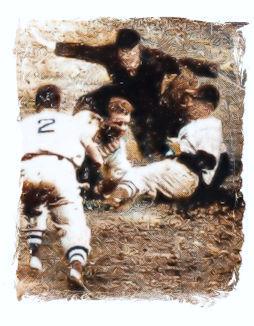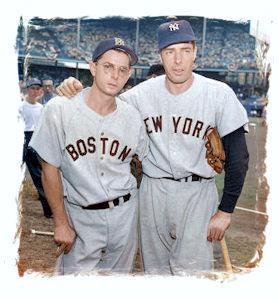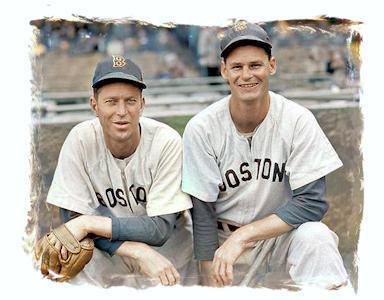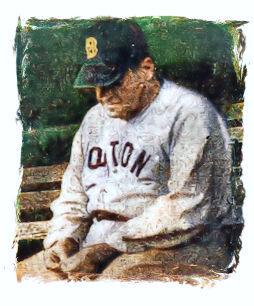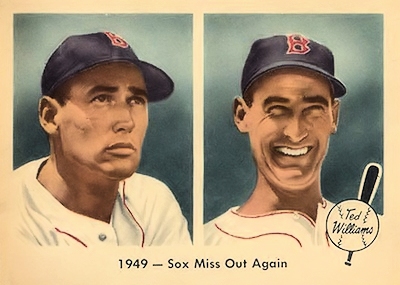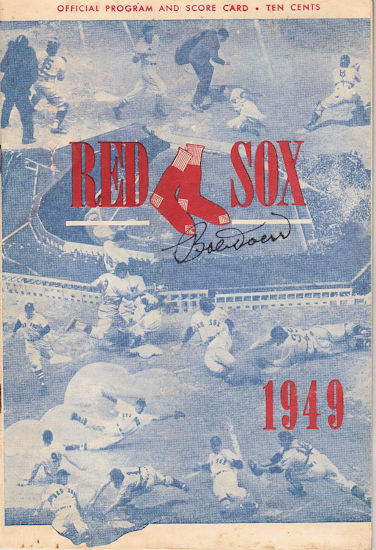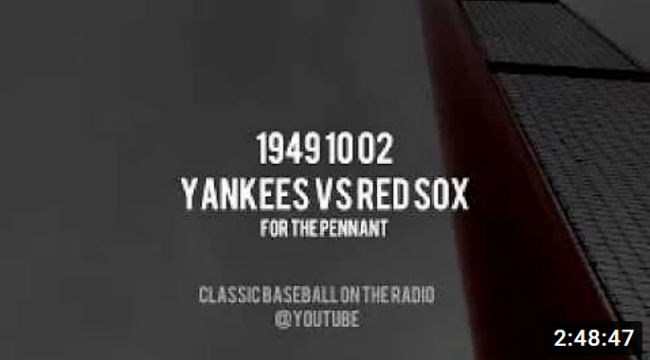|
1949 BOSTON RED SOX ...
After the devastating loss of 1948, the Red Sox stood pat in 1949. They believed they had the strongest team in baseball. The lineup was filled with the league's best hitters and opposing pitchers hated facing them in Fenway Park. Sox officials believed that the Indians had played above their heads and the Yankees were on the way down. Joe DiMaggio was out after having heel surgery for bone spurs and the team's hiring of Casey Stengel, as manager, seemed to be an admission of mediocrity. The Baseball Writers Association of America picked the Red Sox to win the 1949 pennant easily. The Red Sox outfield was solid with Ted, Dom DiMaggio and Sam Mele. The infield was iffy with Walt Dropo at first base, but Vern Stephens, Johnny Pesky and Bobby Doerr were the tested veterans. A lot depended on the Sox pitching. Denny Galehouse developed a knuckleball while the bonus baby young pitchers, Chuck Stobbs, and Frank Quinn were highly thought of. Mickey Harris came in 22 pounds lighter and Tex Hughson had a full year to recuperate. It was hoped that Mickey McDermott would get better control of his pitches. But Joe McCarthy stuck with a starting rotation of Joe Dobson, Mel Parnell, Tex Hughson, Jack Kramer and Ellis Kinder, coming out of Florida. Parnell and the hard-drinking, Kinder proved to be the aces. And the later Kinder stayed out carousing, the better he pitched. Spring training was relatively uneventful, apart from the usual attention paid to everything Ted said or did. Dom DiMaggio was known as the "Little Professor" for studying the pitchers and keeping a little black book. He kept track of the pitcher's tendencies and what they would throw in certain situations and on certain counts. It was common practice today, but he was ahead of his time in doing that back then. Coming out of spring training, the Red Sox were heavy favorites to win the American League pennant by the writers. Johnny Pesky had settled in at third base and Matt Batts had a great camp and was much improved.
The Red Sox started slowly. They opened in Philadelphia on April 19th and lost to the A's when Eddie Joost homered off Joe Dobson, 3 to 2. The next day, both Ellis Kinder and Johnny Pesky made throwing errors in the 10th inning and the Athletics again won, 3 to 2. In the final game of the series, Mel Parnell shut out the A's, 4-0, on April 21st. His two-run single in the four-run ninth inning was instrumental. McCarthy was still wrestling with his lineup. All spring he had vacillated between Billy Goodman, who he loved because of his attitude, his versatility, and his ability to hit to all fields, and the giant rookie, Walt Dropo. Dropo went north with the team from Florida, but McCarthy's preference for Goodman was obvious to everyone. Some of Dropo's hits in the spring were of the tape measure variety and although McCarthy saw his power as an asset to an already powerful team, his lack of defensive skills would detract from an infield that was already weak. In the end, the decision became easy because Goodman hurt his shoulder. For the first game with the Yankees at Fenway, on April 22nd, McCarthy went with Tex Hughson. Hughson was a calculated risk. His fondness for throwing in tight on right-handed hitters, even to Joe DiMaggio, at Fenway was a dangerous proposition. In addition, Hughson had been in and out of the Red Sox rotation over the past few years because of injury problems with his arm. McCarthy considered Hughson soft and was reluctant to use him. Leading 3 to 2, Hughson had given up only five hits in six innings. But the bullpen failed. Earl Johnson came on to pitch in the seventh and passed two men and gave up two hits. Boo Ferriss relieved him and gave up a double. The Yankees scored three runs and won, 5 to 3.
The second game, on April 23rd, was one of those typical Fenway Park games that were murder on the ERA of pitchers. Vern Stephens homered twice for the Sox and slammed one over the net, in left field, for a grand slam homer, putting the Red Sox up 7 to 6. Up 11 to 8, McCarthy decided to bring in Ellis Kinder in relief. McCarthy had his doubts about Kinder, with his drinking and his failure to observe even the most basic curfew rules during spring training. Now, in the second game against the Yankees, Kinder kept the hitters off-balance, made them react to him, kept them in doubt, and pitched four innings of shutout baseball to end the game as the Sox came back to win. McCarthy, short of pitchers, and frustrated by the constant injuries to Hughson and Ferriss, thought he had found something. The next day, April 24th, McCarthy decided to use Joe Dobson. The Sox jumped out ahead, 4 to 0, but in the eighth inning, an error by Bobby Doerr made it 4 to 3. Then with two outs, and two men on, Gene Woodling sent the ball into the right field seats, off Sam Mele's glove, for a three-run homer that cemented the Yankees' win, 9 to 4. It was the same old story, as poor fielding had hurt the Red Sox. When the Sox hitters hit, they won big, but when it was a close game and the other team's pitching was good, the Red Sox defense and their lack of a bullpen were liabilities. The Sox had lost 2 of 3 to the Athletics and 2 of 3 to the Yankees to start the season. They were 3 games back when Washington, who had lost six straight games, came to Fenway. The Nationals were shut out by Mel Parnell, 2-0 on April 25th. Parnell scattered seven base hits and didn't allow any runners to get past second base after the first inning. Then it was home against the Athletics. On April 27th, the big bat of Vern Stephens answered the call again and some decent relief pitching was provided by Earl Johnson, as the Red Sox defeated the Philadelphia Athletics, 10 to 6. Stephens matched his performance against the Yankees, by driving in five runs with a pair of long homers. In the second game, the Sox clobbered the Athletics, 12-5. Mickey Harris started and pitched himself out of several jams. The game was put away when Ted homered over the Sox bullpen with Dom DiMaggio on board. Ted had five RBIs and scored two runs himself. In New York, Jack Kramer was a bit wild and Vern Stephens let some balls get by him, as Vic Raschi mowed down the Sox, 7-1 in their first game at the Stadium on April 29th. In the next game, on April 30th, the Sox lost a heart-breaker. Down 2-0 in the seventh inning, the Sox came back and tied up the game when Dom DiMaggio drove in both Dropo and Tebbetts, who were given free passes by Yankee starter, Tommy Byrne. The Sox went ahead the next inning, 3-2 on some smart baserunning by Ted Williams. Ted had clipped Joe Page's first pitch through the "shift" between Rizzuto and Coleman on the right side. Bobby Doerr lifted a fly out to left that was taken by Gene Woodling after he collided with Cliff Mapes and was knocked off balance. Ted saw his predicament, tagged up, and made it into second. He was able to score the go-ahead run on Sam Mele's single to left. With Hughson still in the game, and the Sox up a run, Woodling slapped a single to left to start the bottom of the ninth. Tommy Henrich then connected with one of Hughson's fastballs and parked it into the right field grandstand for a walk-off 4-3 Yankee win.
The final game was on May 1st and the Red Sox went on a hitting rampage, with an 11-2 drubbing. In the first inning, Dom DiMaggio bunted for a hit and came home when Johnny Pesky hit the 8th home run of his career, to put the Sox up quickly against Allie Reynolds. In the third inning, Dom led off with a single, was moved to second by Johnny, and was brought home by Ted's base hit. Vern Stephens' homer into the left field seats, scored Ted and put the Sox up 5-0. The Sox scored two more in the fifth before Ted slammed a grand slam homer into the lower right field stands in the sixth inning. It was his first grand slam in three years. Mel Parnell collected his third straight win, despite battling a very bad cold. He did not weaken until the last two innings, when he was hit hard, giving up two runs on six hits, in a game that was eventually called off in the ninth inning because of rain. Billy Goodman made his way back in the lineup, replacing Walt Dropo who had been hitting only .146, and went 2 for 4. Bobby Doerr ended up with only two hits in 12 at-bats in the three games of the Yankee series. As May began, Doerr thought it was merely a slow start. It soon became a slump. In Detroit for a series with the Tigers, the two clubs battled to a 14-14 tie in the first game. The Sox used six pitchers and nine position players in a game that was stopped after 13 innings. The Sox and Mickey Harris, lost the second game, 5-1, as Ted's homer accounted for the only Sox run. Ted (.352 BA) slugged another home run, along with one by Bobby Doerr, in Cleveland, against Bob Feller. Doerr (.224 BA), however, had gone only 12 for 57 and was slumping. The Indians pounded Jack Kramer for six runs in the second inning and walked away with a 7-3 win on May 5th.
McCarthy was becoming irritable and could not wait to unload players like, Walt Dropo, who couldn't hit, and Sam Mele, who played poorly in right field. On May 6th, the Red Sox traded Stan Spence to the St. Louis Browns for outfielder, Al Zarilla, who had hit .320 in 1948. Dropo was optioned to Sacramento to make room for Zarilla. The Indians beat the Sox in the 12th inning of their second and final game. Mel Parnell battled Bob Lemon to a 3-3 tie after regulation. With the bases loaded in the 12th, Ken Keltner hit a high chopper back to the mound and beat Parnell's throw to first, as Dale Mitchell scored the walk-off winning run, 4 to 3. Dom DiMaggio and Ted collided, going after Lou Boudreau's fly ball in the first inning, allowing two runners to score. In St. Louis the Sox found someone they could beat, sweeping a doubleheader on May 8th. In the first game, which went 13 innings, Earl Johnson pitched two-hit scoreless ball for the final seven innings and walked only one. The Sox hitters put four runs up in the 13th, to coast to a 10-6 win. Darkness cut the nightcap to an eight inning game. Down 3-2, Dom's double in the eighth knocked in the tying and winning runs. The Sox won 4-3 behind Ellis Kinder. The Sox lost the final game of their series at St. Louis, 2-1. Chuck Stobbs held the Browns to three hits, but one of them was a ninth inning walk-off homer to Gerry Priddy. Ted knocked out his sixth homer of the season for the Sox. In Chicago, on May 11th, the White Sox scored in every inning, outlasting the Red Sox, 12-8. They slammed Boston's pitchers, Tex Hughson and Harry Dorish for 15 hits and 26 total bases. Bobby Doerr didn't help, committing three errors in the second inning. After the game, Denny Galehouse was given his unconditional release. He never pitched again in the majors. The Red Sox finally caught a break in the next game. Vern Stephens clouted his eighth homer to give Mel Parnell a 2 to 1 win over Chicago in 11 innings. Parnell had great stuff and struck out eleven and walked only three. The White Sox got four scattered hits over the last eight innings. With two outs in the 11th, "Little Slug" blasted a fastball from Randy Gumpert into the left field stands to put the Red Sox ahead for good. At Griffith Stadium, the Nationals rallied for a 5 to 4 victory over the Sox on May 14th. The Sox were up 4-3 with three runs in the 7th inning. But Earl Johnson couldn't hold the lead. The next day, Joe Dobson allowed the Nats only four hits as the Sox coasted to a 3-0 victory. It was his first complete game of the season. A mental error cost the Sox the final game in Washington. Down by one run going into the ninth inning and Tommy O'Brien on base, Birdie Tebbetts singled him to second. Lou Stringer came in to run for Tebbetts. Sam Mele batted for the pitcher and singled to right. Buddy Lewis fielded the ball and threw a strike to Sam Dente at second as O'Brien rounded third. Stringer overran second and was tagged out by Dente as O'Brien crossed the plate with what would have been the tying run. Umpire Joe Papparella ruled that Stringer was tagged before O'Brien scored, so the run didn't count, and the Sox lost 3-2. The Sox (10-13) won only 5 of the 9 games on the road trip and returned home in 7th place, five games behind the Yankees. Except Bobby Doerr (.216 BA) the top of the Sox batting order was still hitting the cover off the ball, but they were vulnerable when they had to go to the bench. Joe McCarthy didn't panic, thinking that as the weather warmed up, so would the Sox-vaunted hitting attack, but pitching was the problem. Outside of Mel Parnell (4-1), the Sox pitching was hot and cold, while the bullpen was unreliable. At Fenway, on May 17th, Vern Stephens victimized the White Sox, Randy Gumpert, again by dropping the ball into the left field net in the eighth inning, with a man aboard, to give Parnell his fifth victory, 4-3. The next day, in the second game of the series, homers by Ted and Doerr helped Ellis Kinder cool down Chicago, 7-4. In the final game of the series, the Red Sox handed the White Sox a 7-6 victory. The Red Sox came from behind twice to tie the game and once to take the lead, but in the 10th inning, firstbaseman, Billy Hitchcock dropped Vern Stephens' throw, allowing Grover Bowers to score the winning run. As usual, shoddy defensive play and inconsistent pitching offset the sluggers. Chuck Stobbs started and pitched well, but he was removed in favor of Tex Hughson, who was hit hard. The Red Sox trimmed their roster to 25 by sending Harry Dorish and Jack Robinson down to Louisville. On May 21st, the Indians came to Fenway and were blanked by Joe Dobson, 4-0. It was his second consecutive shutout, giving up seven scattered hits, striking out six, and only allowing two walks. He went to a three-ball count only once. Vern Stephens and Ted Williams provided the power. Vern had a double and clouted his 10th homer, while Ted had a double and two singles. Mel Parnell edged Virgil Trucks and the Detroit Tigers, 3 to 2, and also knocked in the winning run himself in the 12th inning on May 22nd. Parnell was magnificent in earning his sixth victory against one loss and completing his seventh successive starting assignment. Ellis Kinder mastered the Tigers on May 23rd, 4-0, and Dom DiMaggio was a big part of it. In the first inning, with Tigers on first and second and one out, Vic Wertz drilled a long drive to center field. Dom ran across the warning track, stuck out his arm as a cushion from the wall, and backhanded the ball, high over his head, as he crashed into the wall. The next play was even better. Hoot Evers smashed a long fly toward the center field door. With his back to the plate, the "Little Professor" watched the flight of the ball over his right shoulder. He hesitated for a split second, wondering if he should just take the rebound off the door. But he decided to go for it and jumped up at least two feet and caught the ball. Without those catches, the game would have been vastly different for Kinder. The Tigers only threatened once after that. The Sox swept the Tigers series on May 24th. Ted walloped a home run and two doubles against the Tigers, at Fenway Park, and the Sox scored two runs in the 10th inning, on Bobby Doerr's single, to win the game, 8 to 7. The game went back and forth, as the Sox bullpen, again couldn't hold a lead. The lack of a good pitching staff and errors in the field literally gave the Browns a win on May 25th. Ex-Red Sox players, Eddie Pellagrini and Stan Spence came back to haunt their former team, but Pelly's disastrous error in the eighth inning, set up a four-run rally that gave the Sox a 7 to 5 come-from-behind victory on May 26th. Two times Pellagrini had singled, and his double in the eighth inning tied the game at 3 to 3. But in the eighth, with the bases loaded and two outs, Dom DiMaggio hit one of the simplest sorts of ground balls to Pellagrini and with a certain force play at second, Pelly fumbled the ball, allowing a runner to score.
Tex Hughson protected a one-run margin for 4 1/3 innings, which was gained on Ted's 10th home run of the year, for a 5 to 4 win over the Washington Senators on May 28th. The Nats came back to win the last game of the series, coasting to a 10 to 4 win. The Sox concluded their home stand with the Athletics in a doubleheader on May 30th. The Red Sox pushed Philadelphia out of second place by sweeping them, 10 to 2 and 4 to 3. Ted substituted quality for quantity when his only hit of the day was a game-winning home run into the Red Sox bullpen, with Johnny Pesky aboard in the eighth inning of the second game. It gave Parnell his seventh win and sent everyone home happily. Joe Dobson had a little trouble in the opener, scattering 10 hits and coasting home behind an 11-hit Red Sox attack, that was good for 18 total bases. Al Zarilla, who had become the favorite of the right-field bleacher fans, knocked in six runs with two singles and a grand slam homer. Billy Goodman seemed like he was on base all day, walking twice and chipping in with three hits, driving in a run, and playing spectacularly in the field. The Sox (20-16) concluded their homestand and the month by winning 10 of their 13 home games. They started the homestand, 5 games behind the Yankees in 7th place and ended in 2nd place but only 1/2 game closer, 4 1/2 behind. In the first two months, the bats of Ted Williams (.333 BA, 12 HRs), Dom DiMaggio (.336 BA), Johnny Pesky (.285 BA), Vern Stephens (.280 BA, 11 HRs) and Birdie Tebbetts (.298 BA), along with the excellent pitching by Mel Parnell (7-1, 1.88 ERA) kept the team afloat early and they devastated the other teams at home. But they were a below-average team on the road, because the hits and home runs at Fenway, were outs everywhere else.
By the beginning of June, Doerr was still slumping and hitting only .212. Then he hurt his back in an exhibition game with the Scranton Red Sox. He was 31 and the creeping thought that this might mean the end of his career haunted him. He was not seeing the ball well against ordinary pitchers, against whom he normally hit well. He went to an ophthalmologist, who assured him that whatever it was, it was not his eyes. Then slowly and steadily, starting in late June, he began to see the ball better and to hit better. On June 1st, Mickey Harris beat the Indians in Cleveland, 3 to 1. Harris outpitched Bob Feller, who was making his first start in two weeks. The Red Sox won the game in a two-run second inning without hitting the ball out of the infield. But after that game, nothing seemed to go right. The Red Sox played sloppy defense and gave the Indians four unearned runs in the third inning as Bob Lemon beat Ellis Kinder, 8 to 3 on June 2nd. Kinder had given up 10 hits and didn't even make it through the third inning. With a record now of 4-3, he seemed on his way to a mediocre season. But young Chuck Stobbs was impressive and worked 5 1/3 innings, giving up six scattered hits. The next day, June 3rd, Early Wynn beat the Sox, 8 to 1 on a four-hitter. The Indians slammed Joe Dobson for six runs in the first inning. The Red Sox looked lackadaisical and seemed to have no spark. Doerr was out, Tebbetts seemed tired and Ted was 0 for 9 in the last two games, only twice hitting the ball out of the infield.
Joe McCarthy was furious with the way the Sox were playing. On the train from Cleveland to Detroit, he walked through the Pullman Car to find his players stretched out on the double seats, sleeping in broad daylight, blew his top, and roared a few choice words at them. The trip to Detroit turned out to be just as bad. Mel Parnell started in the first game on June 4th, and at one point the Red Sox led, 7 to 1. Parnell was bothered by what he felt was a flat pitching mound and blamed that for losing his control. McCarthy went to Hughson, who he did not like, but by the eighth, the Sox were still ahead 9 to 6. McCarthy then called on Earl Johnson, who was one of the best relief pitchers on the Red Sox. With a good sinker ball and a screwball, Johnson made the hitters hit the ball into the ground. But on this day, Johnson was sick with the intestinal flu and had not even wanted to go to the ballpark. McCarthy ordered him to go to the bullpen and Earl struggled to make it out there. He came into the game and gave up a hit to George Vico and then walked three men in a row, to force in a run, making it 9 to 7 with the bases loaded. Johnson had never walked three men in a row before in his life. McCarthy was livid, came out, and brought in Kinder. As he and Johnson got to the dugout, McCarthy commented to his bench that Johnson was not much of a big league pitcher if he could not get the ball over the plate. Kinder gave up an outfield fly which scored a run and made it 9 to 8. He then gave up a single that tied up the game. After he walked a man, Kinder faced a pinch-hitter Connie Berry, who was batting .085. He walked him on five pitches and the Tigers had the lead and the game, 10 to 9. The Sox committed six errors in this terrible ball game. Joe McCarthy finally blew his top at his lethargic team. He imposed a midnight curfew on all his players. He no longer was going to tolerate sore arms, bad backs, aching muscles, and other schoolboy excuses. He thought all his players were soft and especially went after Joe Dobson. The next day, June 5th, was a doubleheader. Dobson volunteered to come right back after getting hammered by the Indians two days before. He started the first game, pitched solidly, and won it, 5 to 3. Ted and Matt Batts provided the offense with homers to win it.
Harris started the second game, but his arm was hurting him. He didn't say anything but gave up seven runs in the first six innings. With the game virtually gone, McCarthy again called on Earl Johnson, who was still sick. Johnson went out to the mound feeling weak and feeble and pitched like he was throwing batting practice. He gave up six hits and four runs in one inning, but McCarthy left him out there to dangle in the wind. When Johnson came back into the dugout he again heard McCarthy say something to the rest of the bench. At that point, Earl shot back and let McCarthy have a piece of his mind. The Sox lost 11 to 5 and McCarthy could not control himself, he was furious at Johnson and even more furious at Kinder. Kinder was always breaking the rules and he was the last man on the bus, looking like he had been having a party all night long. Kinder didn't care about McCarthy and his curfew. As far as Kinder was concerned, McCarthy had double standards. One was for his stars and one for the rest of the team. He was not going to be bothered observing any curfew. The Sox salvaged the final game, 10-9, on June 6th, and had a split of the series. Kinder came in with men on second and third, and no outs in the ninth inning. He protected the one-run lead. The win gave the Sox a split of the ragged four-game series. In St. Louis, Mel Parnell's magic failed him one more time, as he lost for the second time to the Browns this year, in the opener of the series on June 7th. He was wild, walked seven, and was touched for ten hits, including four doubles. The next day the Sox lost again, 5 to 2 with Dobson on the mound again. He was starting his third game in six days and gave up 11 hits in 6 2/3 innings. In the final game of the series, the Red Sox hit rock bottom. They allowed Browns rookie, Dick Starr, his first major league victory of the year after seven straight losses, losing 11 to 0. It was the first time the Sox had been shut out since August of last year. On June 10th, Earl Johnson held the White Sox to four hits, before going out for a pinch-hitter. But he lost the game, 4-2, in the third inning when the White Sox chalked up four runs without hitting the ball out of the infield. Johnson had gotten spiked by rookie Herb Adams on a play at first base in the first inning. He retired six batters in a row and then his leg stiffened up. After an off day, the Sox exploded in a doubleheader sweep of the White Sox on June 12th. Parnell and Kinder each pitched complete games and Vern Stephens made the big noise of the day with seven RBI on four singles, a double and a home run. He was four for four in the opening game and knocked in a pair of runs that tied up the game at 4 to 4 in the eighth inning of the second game. Parnell had an easy time in the opening game, as his teammates belted out 13 hits for 26 total bases and a new high for runs scored, in the 15 to 3 win. Bobby Doerr was finally back in the lineup and came through with a 420-foot home run over the scoreboard in center in the first game. Kinder had to work harder in the second game and started the winning rally in the ninth himself with a base hit. With one out and the score tied, Kinder, Dom DiMaggio and Johnny Pesky all singled. Ted Williams walked and Stephens reached on a booted ground ball. Doerr hit a long sacrifice fly and the Red Sox scored three runs that led to a 7 to 5 win. The Sox came home after the dismal 5-8 road trip. They were in 2nd place, 4 games out when they left, and were now in 4th place, 6 1/2 games behind the Yankees. It seemed that none of the pitchers knew who was going to pitch and when. McCarthy waited until midseason before concluding that Kramer, Hughson and Harris couldn't win. They all were getting hurt and as each man went down, McCarthy questioned his fortitude. And bonus baby, Chuck Stobbs, wasted away while the other bench position players hardly ever played.
What the Red Sox needed was pitching. On June 11th, both Sam Mele and Mickey Harris were traded to Washington for pitcher, Walt Masterson. Mickey McDermott, who had been mowing down the hitters in Louisville, was finally brought up. The Red Sox returned home on June 14th and met the Cleveland Indians. Joe Dobson was back on the mound for the Sox and was assaulted for six runs in the first inning, during which Joe Gordon hit a grand slam home run. The next day, newcomer Walt Masterson weakened over the final innings, to lose a one-run lead and eventually the ballgame, as the Indians scored three runs in the eighth inning and won the game, 6 to 4. The Indians swept the series by winning the final game, 6 to 3 against Mel Parnell. When McCarthy finally decided to use McDermott and Stobbs in June, the Red Sox won 10 of 11 and six in a row. Bobby Doerr started to hit and Dom DiMaggio was starting a 33-game hitting streak. It all started with a sweep of the White Sox at Fenway Park. Although he required the assistance of Tex Hughson and Walt Masterson in the evening game, of a day/night doubleheader on June 17th, Mickey McDermott won his first major-league game against the White Sox, 10-8. In the afternoon game, the Red Sox shook off their first-inning jitters to help Joe Dobson get his fifth win of the year. With the game tied and with one out in the ninth inning, Johnny Pesky slid into first base to beat a close play. Ted walked and Stephens drilled a single just inside the foul line in left, to drive in Pesky with the walk-off run and a 4 to 3 victory. Kinder won the second game, his sixth win of the year, but needed help in the ninth inning from Parnell.
The Sox won their third straight game over the White Sox, 7 to 5 on June 18th. Kinder had a 7 to 2 lead with two outs in the ninth when five White Sox batters, in a row, knocked out base hits. On June 19th, nineteen-year-old Chuck Stobbs won his first major-league game, as the Red Sox swept a four-game series with the White Sox, 9 to 2. Masterson won his first game as a member of the Red Sox, 6 to 1, on June 20th, but had to retire with a sore elbow in the seventh inning. The Sox battered three Detroit pitchers, getting two runs in the third inning on three singles to load the bases before Vern Stephens knocked them in. In the fifth inning, singles by Ted and Stephens, followed by a double from Bobby Doerr, counted for two more runs. In the second game against Detroit, Parnell (9-3) cruised to a 7 to 1 victory. The Tigers gave the Red Sox their first four runs on booted balls, while the Sox robbed the Tigers of at least four runs on splendid defensive plays by Pesky, DiMaggio and Stephens. It was the Sox's sixth win in a row. The Tigers took the final game of the series and stopped the Red Sox winning streak, 13 to 4 on June 22nd. They clipped Joe Dobson, Tex Hughson, Earl Johnson and a new pitcher for the Sox, Johnny Wittig, for 18 hits. Mickey McDermott's second start was a great one. He shut out the St. Louis Browns, 7 to 0, on June 23rd, on three hits. He showed fine control with a blazing fastball and faced only 28 men, walking two and striking out six. His defense gave him brilliant support with four doubleplays. Mickey needed only one run but got seven mainly because of the three doubles hit by Ted, the three singles hit by Dom DiMaggio and the fifth home run of the year from Al Zarilla. On June 24th, the Red Sox racked up 21 runs and knocked out 25 hits, scoring in every inning, as Kinder limited the St. Louis Browns to two runs and five hits. Ted knocked in seven runs with a pair of home runs and a single. Goodman had five straight hits, Dom had four, and Pesky and Stephens each had three. Every member of the Red Sox team at least had one. But when McCarthy was asked why his bench players were not given a chance to play in the game and replied that the game is not won or lost until the last out is made and he was going to stay with his regulars. Then, the next day, June 25th, the Sox exploded again against the hapless Browns, this time by a 13 to 2 score. Mel Parnell was the recipient of the second offensive explosion in two days, picking up his 10th win and pitching his 13th full game. He was now the American league leader in complete games. The game was basically over in the third inning when the Sox scored seven runs. Every Red Sox batter knocked in at least one run. The Sox concluded a four-game sweep with a 5 to 3 victory over the Browns, on June 26th, behind the pitching of rookie Chuck Stobbs and the batting of his battery mate, Matt Batts. It was the second major league triumph for Stobbs, as he held the Browns to seven hits. It was a close struggle as Batts broke up a one-to-one tie with a double off the left-field wall to bring two runners home, and then scored the winning run on a double by Stobbs. On June 27th, Joe DiMaggio, who had been out all season with bone spurs on his heel, got out of bed, and miraculously, the pain was gone. For the first time in weeks, he went out to Yankee Stadium and had a workout and then took batting practice. When the Yankees left for Boston the next day, he was not sure he would make the trip. He was torn between his desire to play and the fear that he wasn't ready for real pitching. He did not want to embarrass himself and hurt the team. When the Yankees left by train in the morning, on June 28th, he was still undecided, but finally, he boarded a 3:15 plane to Logan Airport. At 5:15 he arrived in the clubhouse and manager, Casey Stengel was surrounded by reporters, who were asking for the lineup. DiMaggio was dressing slowly and finally told Stengel he would play. So, after missing 65 games, Joe made his 1949 debut against the Sox at a jammed Fenway Park. In the game, Mickey McDermott was making his third start for the Sox. In his first at-bat in the second inning, McDermott came in with a fastball around belt high and Joe slapped it over Vern Stephens' head for a base hit.
In the third inning, with the Yankees up 3 to 0, Phil Rizzuto singled to start the inning, and then Joe came up again. This time Joe hit it over the wall in left. Rizzuto jumped up and down like a little kid as he crossed the plate. The Yankees were up 5-0. The Red Sox made a determined bid to save McDermott from his first major league loss. He pitched three-hit shutout ball after Joe's home run and struck out nine Yankee batters. It came down to the ninth with the Yankees up one run. With the tying run at third base, up came Ted. He lined one deep to center, but not deep enough. For the topping on his comeback, Joe caught Ted's final bid to win the game, limping back to catch it at the wall, stranding the winning run on third. The Yankees won the game, 5 to 4, breaking the Sox winning streak. The next day, June 29th, Joe DiMaggio was even better. With the score tied at 7 to 7 in the eighth inning, with two outs and nobody on, Joe came up. Earl Johnson was pitching for the Sox and put the ball exactly where he wanted to, about six inches off the outside, but Joe reached down and golfed the ball over the wall and into the screen. As he neared the dugout, out came Casey Stengel, and as one never to miss an opportunity for theatrics, bowed down to his superstar. The Yankees completed a 9 to 7 comeback victory. There was one game left on June 30th and Joe DiMaggio wound up the greatest series with the Red Sox of his career, amid one of the wildest ovations ever given a visiting ball player. It was a personal triumph for Joe. His prodigious three-run homer hit the light tower in left field. When the "Yankee Clipper" went out to his position, he received a tremendous ovation from the fans in the bleachers and he responded by tipping his cap. New York won 6 to 3, and by sweeping the Red Sox, the Yankees led them by a full game.
The three-game sweep, was huge considering the Sox only lost 16 games at Fenway in all of 1949. Joe DiMaggio, in three games, batted .455 and had demolished the Red Sox with four home runs and nine RBIs. Even before the series, Joe's return had become a day-by-day soap opera. Now he was a national sensation, so much so, that he sold his account to Life Magazine for $6000.
After the Red Sox were swept by the Yankees they became unraveled. In Philadelphia, they lost three in a row to the Athletics. On July 1st, they were trounced, 11-5 as Jack Kramer couldn't get out of the second inning. The next day, Chuck Stobbs pitched another good game but got no support from his hitters and the Sox lost, 3 to 1. In the finale, the Sox lost their sixth straight game, 8 to 3. The Sox fell to fifth place, ten games behind the Yankees. The Sox trudged up to Yankee Stadium on July 4th for a doubleheader and kept rolling along in reverse. They were knocked off, 3 to 2 and 6 to 4, by the Yankees. In the opener, they outhit the Yankees 10 to 5 and knocked out two home runs. Dom DiMaggio homered in the first inning and Vern Stephens hit one in the fifth. Entering the ninth-inning the Red Sox trailed 3 to 2. Johnny Pesky kept the Red Sox hopes alive with a single to center. He raced over to third when Ted singled to right. They had Vic Rashi on the ropes when he walked Vern to load the bases. Up to the plate came Al Zarilla. All he had to do was get the ball up in the air and the Red Sox would have a tie score. As he walked up, a terrific dust storm came in from the back of the bleachers in left field to almost black out the stadium. While the dust and papers blew over the already dark field, the game was halted. When play finally resumed, Zarilla drilled what looked like a sure single to right field. But instead of running for the plate, Pesky was heading back to the bag to tag up at third base. He apparently couldn't see what happened through the dust and darkness and thought the ball might be caught. But the ball landed a few feet in front of Cliff Mapes in right field and Cliff knew what he was doing. He fired the ball to Yogi Berra at home. As Pesky retraced his steps, he saw Ted running right toward him from second. Pesky finally realized the ball had dropped safely and stopped short of the bag. Ted was screaming at him to get going, and as Johnny turned, he stumbled. Mapes' throw reached Yogi Berra on one bounce. Berra, seeing what was going on, did not try to protect the plate but came out to get the throw, keeping his foot on home plate and stretching for the ball. He caught the ball and a split second later, Johnny came sliding into home. Pesky hit Berra with everything he had but Yogi picked himself up and held the ball aloft so that all could see that he still had it. The umpire, Joe Papparella, called Johnny safe. When Berra heard that he screamed at the umpire, and Papparella screamed back that Berra had not tagged him. Berra of course, knew that it was a force play and he didn't have to tag Johnny. Papparella changed the call, telling Johnny he was out. So instead of the Red Sox getting the run to tie the game, the Red Sox lost 3 to 2.
In the second game, Joe DiMaggio came through again and tied up the game with a home run in the fifth. It was his fifth home run in his first week back. The Yankees won it with two runs in the seventh, 6 to 4. At the end of the day the Sox were 12 games out of first place and only 11 1/2 games out of last place. Not since Tom Yawkey had bought the Red Sox, had they ever lost his many as eight straight games. It was Mickey McDermott, who finally brought the Red Sox losing streak to a halt on July 5th. Home runs by Tommy O'Brien and Dom DiMaggio gave Mickey the runs he needed in the 4 to 2 much-needed win over the Yankees. Pitching in the biggest pressure moment of his life, McDermott fought off streaks of wildness in the last two innings, to preserve his precarious lead. The Red Sox had won only 36 games and lost 36 games and were in fifth place, 11 games behind the Yankees, and were emotionally exhausted. Joe McCarthy admitted that his nerves were shot and he couldn't sleep. Despite all this, Ted was second in the American league in batting, hitting .319, tied for the league lead in RBI with Vern Stephens at 55, and second was Stephens in home runs with 14. Ted was having one of his best seasons, and six of the eight Boston regulars hit over .300 from July to the end of the season. Ted had discovered the physics of the way a bat worked and how it could determine whether or not it would affect his performance. Working with some people from MIT, he discovered that drying the wood made the ball travel better. He then took great care with the treatment of his baseball bats. He was right and his production numbers soared.
So why were the Red Sox so far behind? While the Red Sox regulars liked the way Joe McCarthy left them alone and played them every day, the bench players weren't happy at all. They knew that if they were called upon, they would be so stale, that they would probably fail, and had no confidence. The pitching was inconsistent. Mel Parnell was one of the top pitchers in the American League, and it looked like they had found something in Mickey McDermott. But after that, it was a roll of the dice. On their two previous trips out to oppose the Western clubs, the Red Sox won 8 and lost 13. Not only could blame be placed on the pitchers, but they also needed run support. The Red Sox regulars had a batting average of .330 at Fenway Park but batted .259 on the road. Dom DiMaggio had a .338 batting average at Fenway Park and .340 on the road and was one of the few playing very well everywhere. Johnny Pesky was hitting .248 on the road and yet had a .302 season batting at Fenway. Vern Stephens was not a Fenway Park home run hitter, having hit an equal number of home runs in Boston and away. Birdie Tebbetts was batting .360 at home but fell away to a mere .247 on the road. Amid rumors about the impending firing of Joe McCarthy, the Red Sox left Yankee Stadium and went down to Washington, to face the Nationals on July 6th. In a game shortened to five innings by a rainstorm, the Red Sox had scored five runs and were declared the winners, 5 to 0. Ellis Kinder was credited with a shutout, having given up just four hits. The Red Sox beat the Nats in the second and final game of the series, which was suspended after six innings, so the Red Sox could catch a train back to Boston. At the time the score was 8 to 3 in favor of the Red Sox. The Sox got five hits, two of them being doubles by Vern Stephens, but they were also allowed 13 free passes that enabled them to win the game. (The game was later completed on August 20th, with the Sox winning 8 to 4.) The Red Sox came back to Fenway Park on July 8th and beat the Philadelphia Athletics, 7 to 1, for their fourth win in a row. A four-run third inning, featured by Stephens' two-run homer, his 20th of the year, won the ballgame for Joe Dobson. On July 9th, the Red Sox staggered to their fifth straight victory, edging the Athletics, 7 to 5. Up by five runs, Mel Parnell gave up a single run in the eighth and a two-run homer in the ninth, cutting his lead to just two runs. After Parnell walked the next batter, Tex Hughson came in and struck out the last batter to end the game. The Red Sox had a long day on July 10th, playing two games until 7:45 in the evening, when the second game was called because of darkness. The Sox belted Philadelphia pitching in both games, beating the Athletics, 8 to 5 and 11 to 10. Features of the long afternoon included Ted's' 20th home run in the second game, Ellis Kinder withholding late-game attacks from the Athletics in the first game to win his 5th straight, and the batting of Dom DiMaggio, Bobby Doerr, Tommy O'Brien and Billy Goodman. Jack Kramer, the Red Sox's fourth pitcher in the second game, retired Hank Majeski with the bases loaded for the final out in the eighth inning. The Athletics were outraged when umpire Cal Hubbard called the game after they had rallied for three runs in the eighth inning, cutting the Red Sox lead from four runs to just one run. They claimed there was sufficient light to allow one more inning to be played and Earl Mack said he was protesting the game to President Harridge. Before the All-Star Game, the Red Sox scored six runs in the eighth inning to beat the Braves 6 to 2, in the Community Fund game at Fenway Park on July 11th. The only good news for the Red Sox was a consolation of sorts. Ted, Dom DiMaggio and Birdie Tebbetts were all selected as starters in the All-Star Game. Billy Goodman, Mel Parnell and Vern Stephens were also added to the American League team. The American League All-Stars beat the National League All-Stars 11 to 7, in the All-Star game held at Ebbets Field on July 12th. Joe and Dom accounted for seven of the 11 runs for the American League. The Nationals made five errors with two of them coming in the first inning, when the Americans scored four unearned runs. The Americans jumped out to a quick 4 to 0 lead and the Nationals came back to make it 3 to 4 in the second inning when Parnell was chased from the game. Mel was wild giving up a walk a single and a hit batsman to load the bases. Dom DiMaggio opened the sixth with a double to left after George Kell drew a walk. Ted came up and flew out to center, letting Dom scamper over to third. Brother Joe belted a double to left to score his little brother as well as Bob Dillinger, who ran for Kell, making it 8 to 5. With two outs in the seventh Dom came to bat with Joe Gordon on second base. He clipped a single to left to score Gordon to highlight a three-run inning. The DiMaggio brothers contributed four RBIs and three runs scored. Ted made a great catch in the game off Dodger pitcher Don Newcombe. He was playing away from the foul line and Newcombe hit a screaming line drive twister to left field. Ted galloped after it, stuck out his right arm as far as he could and caught the ball. If he hadn't caught it, the ball would have been good for at least a double and two runs. Ted played six innings, nursing a rib injury that he had gotten the last week. After the All-Star break, a favorable schedule let the Red Sox play against the worst teams in the league and against them, the Red Sox were almost unbeatable. Everybody played well and feasted on lesser pitching. In Detroit on July 14th, the Sox made it eight straight, downing the Tigers, 5 to 2 on Al Zarilla's two-run home run in the eighth inning. But the bullpen blew a three-run lead in the ninth inning, handing the Tigers an 8 to 7 win on July 15th. With an 11 to 1 drubbing of the Tigers in the final game, Sox batters blasted 13 hits with home run power supplied by Ted Williams (21 HRs), Birdie Tebbetts, Bobby Doerr and Zarilla. Mel Parnell (12-5) allowed only four hits and walked only three. In Cleveland on July 17th, the Red Sox split a doubleheader, and the big bat of Vern Stephens the American League home run leader (23 HRs) and RBI leader (93), was responsible, as the broad-shouldered Sox shortstop hit two home runs that knocked in all of the Sox runs, one in a 4 to 2 loss, followed by one in a 2 to 1 win. His home run in the ninth inning of the second game gave Chuck Stobbs his fourth victory. The final game of the series was a 1 to 0 pitchers duel and Mickey McDermott found himself on the losing edge to Mike Garcia. The Red Sox stranded 10 baserunners, not giving McDermott the support he needed. Vern Stephens again rescued the Red Sox, at Comiskey Park in Chicago, beating the White Sox, 6-4, on July 19th. He lined a ninth inning, bases-loaded single, driving in the two runs that won the game for Ellis Kinder (10-4). The White Sox returned the favor with a ninth-inning walk-off the next day. Mel Parnell, aided by home runs by Stephens and Ted, won his 13th game in St. Louis, against the Browns on July 22nd. Then, the next day, the Sox clobbered the Browns, 15 to 5, in a 19-hit attack, including another homer by Ted and two by Bobby Doerr. Chuck Stobbs got his 5th win, hurling his 6th complete game. The Sox split a doubleheader to wind up the series on July 24th. They came from behind twice, scoring five runs in the 7th inning of the first game to take an 8 to 7 lead, only to lose it, 9-8. In the second game, they came from behind, scoring four runs in the 7th inning, and held on to win it, 8 to 4. It was Jack Kramer's first win of the season and Ted socked another home run. The road trip ended with the Sox winning seven of the twelve games. They came home in third place, 8 games behind the Yankees.
Ted was on a tear, leading the American League with 25 home runs and 100 RBIs, one ahead of Vern Stephens (24 HRs, 97 RBIs). Ted and Dom DiMaggio were tied for the A.L. Batting leadership, hitting .324. Ted also led the league in hits with 115, one more than Johnny Pesky's 114 hits. The Sox, as a team, were leading the league in hitting. The pitching also improved when Joe McCarthy settled on a rotation, using Mickey McDermott and Chuck Stobbs, behind Mel Parnell and Ellis Kinder. Sox pitchers completed seven games on the road trip. The Red Sox exploded for 10 runs in the eighth inning and opened up their long homestand with an impressive 11 to 2 victory over the White Sox at Fenway on July 26th. The game was highlighted by a duel between Ted and Vern Stephens for the league's leadership in RBIs and home runs. The second game saw a shutout thrown by Mel Parnell, 6 to 0. In his 14th win, he limited the White Sox to just three scattered singles. Parnell, himself, had three hits in the game. In the third game of the series, the Sox's fine pitching continued. Ellis Kinder won his 11th game without walking a batter and Ted blasted his 26th homer in the 6 to 1 win. The Sox and Indians split a doubleheader on July 29th. Joe Dobson limited Cleveland to four hits as Doerr and Al Zarilla provided the scoring in a 2 to 1 afternoon victory. The Tribe scored four runs in the first inning and went on to beat the Sox, 9 to 3, behind Bob Feller in the nitecap. Then on July 30th, Parnell was beaten in a four-run 10th inning by the Indians, 10-6. The next day, Mickey McDermott shut out the Tribe, 3 to 0, getting out problems in the clutch, leaving 11 runners stranded, walking three, and striking out seven. Dom DiMaggio's hitting streak reached 27 games, breaking Johnny Pesky's record streak of 26 games, done in 1947. In the finale, on August 1st, Ted (105 RBIs) drove in the winning run in a 4-3 game, in Parnell's 15th win of the season.
In August, the Red Sox became a hot team and made a run at the Yankees. There was nothing more satisfying to the players than seeing their team achieve its true potential. They began to believe in themselves. The Yankees, on the other hand, were beginning to wear down based on their age and injuries in August. Dom DiMaggio (.344 BA) was second in the league and Ted (.341 BA, 26 HRs, 105 RBIs) was third. Vern Stephens (.299 BA, 25 HRs, 104 RBIs), Johnny Pesky (.296 BA) and Billy Goodman (.286 BA) provided the nucleus, along with Bobby Doerr (.280 BA), who had broken out of his slump in July. On June 16th Doerr bottomed out at .207, and on June 25th he was batting .214. Since then he was batting .384, with 58 hits in 151 at bats. Even while the Red Sox were losing, it was Dom DiMaggio started a hitting streak. He hit in 34 straight games before his streak ended, for a Red Sox record. He had been hitting about .325 when the streak began. He was on base in every game, at a time when many Red Sox players had lost their concentration and fallen apart. The streak brought back the excitement that helped the team come alive. By the time it was over, the Sox were playing well and their pitching was improving, letting them sneak back into the pennant race.
On August 2nd, Dom won the game for the Sox, with a walk-off on a broken play, that let him score the winning run in the bottom of the ninth against the St. Louis Browns. In the next game, on August 3rd, Ellis Kinder (12-5) struck out a remarkable total of 14 batters, while the Red Sox beat the Browns, 9 to 3. The Sox continued their batting practice against the Browns, 12 to 2, in the last game of the series, for their fifth straight win, and the ninth in their last 11 games. Detroit was shutout by Jack Kramer, 9-0 in the first game of the series at Fenway. Mel Parnell (16-6, 2.85 ERA) spun another shutout against the Tigers in the next game, 3-0, on five hits. He was the first pitcher to win 16 games in the majors. In the final series game on August 7th, McDermott got beat up for the first time, 6-4. Ted (.346 BA) had three hits, including his 27th home run. Vern Stephens (27 HRs) tied Ted for the league lead with his homer in the ninth inning. Dom DiMaggio (.342 BA) ran his consecutive hit streak to 34 games. On August 9th, the Yankees came back into Fenway Park for a three-game series. The Sox were playing at a .680 clip, winning 17 of the 25 games played since the All-Star break, gaining 2 1/2 games in the standings. The Red Sox were six games out and needed to beat them badly. In the first game, each club hit a pair of home runs but the Sox won the game because their home runs came with men on board. Dom DiMaggio, who had hit in 34 straight games, was stopped. He had five trips to the plate and the last time up, he lined a pitch hard that carried into centerfield, right at his brother, Joe. But more importantly, the Red Sox won the game, 6 to 3, boosting Ellis Kinder's record to 13-5. Kinder had won 7 of his last 8 starts. The Red Sox lost the next game, on August 10th, by a 3 to 2 score, as the Yankees came back after being down, 1 to 0, to score 3 runs in the sixth inning. Then, on August 11th, the Sox won 7 to 6, on Bobby Doerr's run-scoring single in the sixth inning. Mel Parnell protected the lead to get his 17th win, his first in relief. However, Parnell blew a three-run Red Sox lead, after he came in to relieve the starter, Jack Kramer, in the sixth inning. Ted had seven hits in the three games and the Red Sox had closed the gap to five games. Stephens was in the best shape of his career and having a good season. He was the kind of player who played hard all day and then played hard all night. He was not much of a drinker, but more of a carouser and stayed out late. His teammates thought he would wear out, but no one was going to tell him what time to go to bed as long as the Red Sox were winning. More teasing and clowning was going on now that the team was winning. Birdie Tebbetts, the prime needler on the team, took great pleasure in provoking Ted. He would pick his spots, and give Ted something that the sportswriters were saying about him, just to get under his skin. Ted would always fall for it and get pissed off. The sportswriters loved Tebbetts and would always gather around his locker to get the latest news.
Washington was in town next, and in a day-night doubleheader, on August 12th, the Red Sox emerged in second place, by winning two games from the Senators, 15 to 7 and 13 to 11. The wins cut the Yankees' lead over the Sox to 4 1/2 games. Stephens slammed out a home run and knocked in five runs, being the big gun in the second game, a hectic win where Billy Hitchcock stole home in the eighth inning to break in an 11 to 11 tie. Stephens clouted a grand slam in the bottom of the 12th, giving the Red Sox a walk-off 5 to 1 thriller over the Washington Nationals on August 13th. It carried Kinder to his 14th victory the year for his fourth consecutive victory and his 10th of his last 11 decisions. In the next two games of the series, a doubleheader on August 14th, the Red Sox staggered the Senators by scores of 9 to 3 and 13 to 4. Parnell breezed to his 18th victory of the year in the opening game, holding Washington to seven hits. Dom led the assault, cracking out three hits in each contest, including his seventh home run of the year, with a man on, in the first game. He had a seven-game hitting streak and had hit safely in 41 of his last 42 games. Stephens hit his 31st home run of the year and picked up five more RBIs to increase his total to a major league-leading 130.
Ted slammed out a game-winning single in the last 11th
inning to give the Red Sox their seventh straight win with a 3 to 2
score, in one of the top thrillers of this baseball season on
August 15th. The Washington
Nationals gave a good effort to try and break the Red Sox streak when
they tied up the game at 1 to 1 in the ninth inning but lost the
game two innings later. By sweeping the Nats the Sox had won 19
of the 23 games played in the homestand, and enabled them to move to
2 1/2 games ahead of the league-leading Yankees. When the Sox started
the homestand they were 7 1/2 games out. Ted Williams (.356 BA, 30 HRs, 120 RBIs) was leading the American League in batting, and Vern Stephens (31 HRs, 131 RBIs) was leading the league in home runs and RBI, when the Sox took the train to Washington to play the Senators at Griffith Stadium. On August 19th, Kinder (15-5) spun a three-hit shutout, 6-0 against the Nats for his fifth consecutive win. The next game saw Parnell throw a dominating five-hitter and win the game, 7 to 1. The script of fine Sox pitching continued in the third game, on August 21st, when Jack Kramer won his fourth straight game, after starting the season by losing six straight, with a 4 to 0 shutout. Since losing eight straight games at the beginning of July, Sox pitchers have won 35 games and lost only 10, finishing 32 games. Stephens added five more RBIs in the series to bring his league-leading total to 136. After losing a single game to the Browns in St. Louis, the Sox traveled up to Chicago and were beaten by the White Sox, 8 to 3, when Mickey McDermott suffered a shoulder injury after throwing only five pitches. The Sox bats came alive in sweeping a doubleheader against the White Sox, 11 to 4 and 10 to 7 on August 26th, the following day. Parnell (20-6) became baseball's first twenty-game winner in the first game. Bobby Doerr had five hits including a double and a triple, knocking in seven runs. Ted belted two homers, a double and three singles, with four RBIs. The Sox won the final game of the series, on August 27th, behind Chuck Stobbs, 7 to 2. Ted Williams (.358 BA, 34 HRs, 132 RBIs) had two more homers, Vern Stephens (.303 BA, 34 HRs, 139 RBIs) slammed a home run and a triple, and Dom DiMaggio (.329 BA) also had two hits. The lead by the Yankees was down to 1 1/2 games. In Cleveland, on August 28th, the Sox lost the opening game in 11 innings, 2 to 1 on a muffed throw by Stephens, and were swept in a doubleheader the next day. Ellis Kinder was the Sox' three-game losing streak stopper in Detroit, shutting out the Tigers, 3 to 0 on five hits, for his 17th win on August 30th. He struck out seven and walked only three. Chuck Stobbs, backed by some excellent relief pitching from Tex Hughson and a pair of two-run homers from both Bobby Doerr and Ted, won his 10th game, 7 to 4 against the Tigers on August 31st. In the last game of the series, the Sox were blanked, 7-0. During August, Parnell and Kinder were 6-0, while Kramer and Stobbs were 3-0.
After winning 22 of their 30 games in August, the Red Sox only trailed the Yankees by three games on September 1st. With eight games remaining between the two teams, the Sox were still in the race. As the Red Sox had surged ahead, the Yankees went from great to simply very good. It wasnt a case of New York having blown a lead, it was that the Red Sox were winning at an unbelievable clip. Back at Fenway Park on September 2nd, Bobby Doerr and Al Zarilla each knocked out a pair of two-run homers in an 8-4 win over the Athletics. The Red Sox made it two straight over the Athletics, 10 to 3, with Kinder (18-5) winning his eighth straight game. He wasn't sharp but held the Athletics to four hits, walked six and struck out six. Stobbs pitched himself out of trouble several times in the last game, as the Red Sox beat the Athletics, 4 to 2, on September 4th. The hapless Washington Nationals were back at Fenway and the Sox once again walked all over them in a September 5th doubleheader, 5 to 2 and 12 to 2. But since the Yankees also won a doubleheader, the Sox remained 1 1/2 games behind. Mel Parnell scattered 11 hits in the first game's first 21st win. He pitched his 23rd complete game, walked only one but gave up hits in nine of the innings. In the second game, Walt Masterson made a rare start and behind a 16-hit barrage against four Washington pitchers by the Red Sox, he allowed his former teammates only seven scattered hits. Al Zarilla was the top hitter for the Sox with six hits in eight trips, including two doubles and knocking in four runs. Doerr homered in the first game and Stephens hit his 36th round tripper for his league-leading 145th RBI, in the second game. The Red Sox went to New York to play the Yankees in a showdown series. In the opening game on September 7th, Jack Kramer pitched against Allie Reynolds. In the eighth inning, the Yankees were ahead 3 to 2. With one out, Doerr tripled into the alley in left. Stengel immediately brought in Joe Page, who struck out four of the five men he faced. The Yankees scored two more on Bobby Brown's home run and won, 5-2. The next day it rained so, after the day off, on September 9th, Ellis Kinder beat the Yankees, 7-1, giving up only four hits and striking out eight, for his 19th win and 9th in a row. Kinder had made 17 starts since June 9th without losing. He had won 15 games and was knocked out in the other two, but was saved by his teammates coming back. His only defeat during the stretch came in a relief role. It was his 16th win in a row, and the Red Sox again were only 1 1/2 games behind New York. As the pennant race war on, there was no room for mistakes. Though not as affected by injuries as were the Yankees, the Red Sox were simply exhausted. Doerr was having a good second half of the season, but he thought some of the players were wearing out, especially Stephens. McCarthy did not use his bench, and Stephens was out there every day, even against the lesser teams, and not getting a day off. In those days, to gut it out was a sign of manliness and no one drove that point home more than McCarthy. As the Red Sox continued their pursuit, they moved down to Philadelphia. In the first game, on September 10th, Mel Parnell won his 22nd game, 9 to 1, giving up only three hits. He had a great slider and was making the A's batters pound the ball into the dirt for most of the game. It was his 8th win in his last nine starts. But the Sox lost their momentum when they lost a doubleheader the next day, 6 to 4 and 4 to 0. The Yankees swept a doubleheader from Washington. They had fifteen games left, and the losses left them three games behind New York. The Red Sox came back for their last home stand of the season and accumulated 16 hits to defeat the Detroit Tigers by a score of 7 to 4 on September 13th. Al Zarilla carried away the slugging honors for the day. Billy Goodman had four singles and Johnny Pesky and Birdie Tebbetts each had three. But Zarilla, who has been moving right along, doubled in the first inning to clear the bases. And in the seventh, he gave the Red Sox another insurance run, after he tripled and scored on Goodman's fourth hit of the game. Mel Parnell picked up a save when he came in to help starter, Jack Kramer. The Yankees were rained out of their doubleheader with the Browns, so they still trailed the New Yorkers by 2 1/2 games. Since the beginning of August, when the pennant race began, both Mel Parnell and Ellis Kinder were each, 9-0, meaning that the two of them accounted for 18 wins of the 32 wins since then. McCarthy took a cue from what the Braves did in 1948, using Johnny Sain and Warren Spahn as much as they could. McCarthy told Kinder and Parnell that they would start with three days rest and maybe less. And when they weren't starting, he wanted them both in the bullpen. Nobody would accuse McCarthy of doing what he had done the year before. Kinder became a 20-game winner for the first time in his major league career on Ted Williams' sixth-inning home run to left field on September 14th. His six-hit pitching and the Ted wallop off Hal Newhowser gave the Red Sox a 1 to 0 victory over the Detroit Tigers. This was his fifth shutout this year. On September 16th, Parnell chalked up his 23rd win of the season, as the Red Sox trounced the St. Louis Browns by a score of 12 to 4. Parnell had now won 33 of his last 40 starts for the Red Sox. Stephens furnished the power for Parnell's win by belting two home runs. Lou Stringer hit a sixth-inning double that beat the Browns 3 to 2, on September 17th. Stringer (.278 BA), who was replacing the injured Bobby Doerr, was getting the job done day in and day out. In the sixth inning, Billy Goodman walked with one out. Then Stringer hit a line drive that went off the wall in left-center and the Sox were ahead 3 to 2. On September 18th, Ted (.351 BA, 40 HRs, 153 RBIs) slammed out two home runs and drove in six runs, keeping the Red Sox on the heels of the Yankees, as they smashed the Chicago White Sox by an 11 to 5 score. Ted's homers helped Ellis Kinder (21-5) coast home to his 11th successive win. A six runs second inning explosion, after two were out, ended any semblance of a ballgame. Vern Stephens (.295 BA, 39 HRs, 150 RBIs) homered also. With ten games remaining on the schedule, the Sox had four more losses than the Yankees and were 3 games behind. The World Champion Cleveland Indians were next at Fenway Park and the Sox couldn't afford to lose a game. Luckily for the Red Sox, Joe DiMaggio came down with pneumonia and the Yankees went into a tailspin. Both Kinder and Parnell were tired, but the burden was harder on Parnell, who had lost a lot of weight during the heat of August. The new schedule of starting and relieving was easier for Kinder, who seemed to be able to pitch one day and go to the bullpen the next. He would just go out there and take a nap.
Parnell's record-breaking pitching and a costly mistake by Bob Lemon made the Indians the ex-world champions on September 20th. Parnell shattered Babe Ruth's record for Red Sox victories by a left-handed pitcher, as he led the Sox to a 5 to 2 victory over the 1948 titleholders. It was the 24th victory for Parnell, erasing the record compiled by Babe Ruth in 1916 and 1917 of 23 wins by a left-handed pitcher. Ted hit his towering 41st home run in the seventh inning to give the Red Sox a lucrative 9 to 6 win over the Indians on September 21st. The scrappiness and confidence of the Red Sox were very apparent in this game. Two times they came from behind to go ahead of the Indians. Kinder pitched two-hit shut out ball over the final three innings in a relief role, to help the Red Sox gain a full game over the Yankees who lost to Chicago. On September 24th, the Yankees came into Fenway Park for a two-game series, leading the Red Sox by two games. Kinder shutout the Yankees, 3 to 0, despite being out until the early hours of the morning, with his friend and Yankee second-string catcher, Ralph Houk. Houk, of course, knew that his old buddy was pitching the next day and kept the drinks coming. He assured his teammates when he came into the clubhouse, that Kinder was in no condition to pitch and the game would be easy. He was very wrong. Ellis Kinder earned his 23rd win of the year, and 13th in a row, not to the 20th consecutive victory for the Red Sox at Fenway Park. No team had won a game at Fenway Park since August 10th. A daring run to home by Al Zarilla gave the Red Sox their first run, one of two that were scored in the second inning. The game's only other run came in the third inning when Ted towered a line drive into the 15th row of the seats in the right field grandstand. The victory brought the Red Sox to within a game of first place. The next game, on September 25th, Parnell played with the speed and movement of his ball. He did not need to overthrow and stayed in front of the hitters all day long. He gave up four hits and three walks to get his 25th win of the season, 4 to 1. Johnny Pesky's two-run single and Ted's (.349 BA, 43 HRs, 158 RBIs) league-leading 43rd home run were the offense. There were six games left to play and the Sox, who were 11 games behind on July 4th, came all the way back to tie the Yankees for first place at 93-55. Both teams traveled down to Yankee Stadium the next day, September 26th, to make up an earlier game that was rained out. It was a sloppy game and two critical plays decided it. The Yankees went into the eighth inning, leading 6 to 3. Stengel had brought in Joe Page in the fifth inning. In the eighth, Page faltered. Tebbetts singled to right and Lou Stringer pinch-hit for Jack Kramer, the Red Sox starter. Stringer walked and with runners on first and second and no outs, Dom slammed a line drive right at Phil Rizzuto. Both runners were running and the ball was hit like a bullet. Rizzuto thought triple play and timed his jump perfectly. He speared the ball and got ready to make the throw to second but saw the runners still moving and not trying to get back to their base. He reached for the ball and it was not there, it had torn through the webbing of his glove. Tommy O'Brien, who had run for Tebbetts, scored.
Pesky was next and he reached first when Snuffy Stirnweiss bobbled his ground ball, allowing Stringer to score. Ted beat out an infield hit and the bases were loaded for Vern Stephens. He lifted a fly ball to Tommy Henrich in right field that allowed Dom to come in from third with the tying run. Pesky moved over from second to third as Bobby Doerr came up. He worked a squeeze play with a perfect bunt down to first baseman Tommy Henrich. Henrich had anticipated the bunt and threw to home, as Pesky slid in under the tag, and the Red Sox were leading 7 to 6. Kinder pitched the last two innings in relief and secured the victory. For the first time all year, the Red Sox were in first place. They were leading by one game with five left to play. On September 27th the Red Sox went down to Washington to play the Nats, who had been easy prey for the Red Sox all season. They had won only three of their previous nineteen games. In the first game, the Red Sox jumped out to a 6 to 0 lead in the seventh inning, eventually winning 6 to 4. The Yankees won also and so their lead stayed at one game. On the next day, September 28th, came what Red Sox fans for many years to come would call, the "Scarborough Game". Ray Scarborough was a good pitcher for the Nationals, perhaps their best, and also a nemesis to the Red Sox. He had beaten them three times the previous year, including a critical game at the end of the season. He was smart and crafty, giving right-handed hitters a difficult time, and he was poison to Ted Williams. He was at his best in this game, holding the Red Sox to only four hits. But Chuck Stobbs was equally sharp and took a 1-0 lead into the ninth inning. McCarthy had both Parnell and Kinder throwing in the bullpen. With runners at first and third and one out, Al Kozar singled between third and short to tie the game. McCarthy brought in Kinder to pitch to Sam Dente, who singled sharply to right. Zarilla charged the ball, held the runner at third and loaded the bases. Buddy Lewis was sent up to pinch-hit and McCarthy countered with Parnell. Some of the Red Sox players were ready for an attempted squeeze and on Parnell's third pitch, Aaron Robinson, the runner sat third, broke for the plate. Tebbetts saw what was going on and moved over to make the tag. Parnell fielded the ball and made a perfect throw to get Robinson. Two outs and Kozar was at third. Buddy Lewis was up and Parnell had him down 1 and 2. The next pitch was a curve that broke too much and bounced wide of the plate. Tebbetts stabbed at it, but it was by him Kozar scored, and Washington won the game, 2 to 1. In their final game on September 30th, the Sox scored 10 runs in the first three innings to beat the Senators, 11-9 on just five hits. The Yankees lost to the Athletics, so the season came down to the two final games in New York, with the Red Sox leading the Yankees by a single game and needing to win just one.
In the opening game, on October 1st, the Yankees celebrated "Joe DiMaggio Day". DiMaggio, still weak from his battle with pneumonia, chose to return for the critical season-ending series. He was going to take it one inning at a time, in the packed Yankee Stadium. With his brother Dom at his side, holding him up during the ceremony, and his mother on his other side, the "Yankee Clipper" received a host of gifts and testimonials. He spoke briefly and then the game started.
Joe McCarthy was not going to play any hunches and went with what had worked. Parnell got the ball opposed by Allie Reynolds. The first game started as a disaster for the Yankees. The Red Sox scored one run in the first inning. Parnell shut down the Yankees early and Joe DiMaggio was ineffective, striking out weakly in his first at-bat. Then in the third, Reynolds lost it, walking Pesky, Ted and Stephens, to load the bases. Bobby Doerr hit a bloop hit into right field for a single as one run scored and Ted was held up at third. Casey Stengel brought in Joe Page, It was only the third inning, but there was no time to waste and Page was having one of the best seasons of relief pitching, he had ever had in the majors, having appeared in 60 games. But he couldn't keep the ball down and walked Al Zarilla to force in Ted. He then walked Goodman on four straight pitches, to force in Pesky, making it 4-0. Although he knew Page was wild, Birdie Tebbetts came to the plate and wanted to break the game wide open right there, with a single swing. Instead of being patient, he swung from the heels on three pitches that were out of the strike zone and struck out. That gave Page a little confidence and he struck out Parnell to end the inning. In the fourth inning, Joe D. lined the ball into right field stands, on one hop, for a ground rule double. Hank Bauer then blooped a ball just out of Pesky's reach and Joe scored. Johnny Lindell singled and then Bauer scored on a sacrifice fly, making it 4 to 2. When Page went back out to pitch the fifth, he was unhittable. He was pure power and at his best. He was pitching without the session, with no curves and no changeups. Every pitch he threw was a challenge as if he was talking the Red Sox hitters. The Yankee bench knew that all they could do was chip away at the lead. In the bottom of the fifth inning, the Yankees continued their hitting against Parnell. Parnell had already thrown 291 innings during the season and pitched in relief, six times in the last month and he was tired. Yogi Berra singled into center, scoring Rizzuto, to make it a one-run game, 4 to 3. McCarthy had now found himself in a dilemma. He had used both Parnell and Kinder in relief down the stretch and it worked because neither pitcher required any relief. But Parnell was tired and McCarthy had to save Kinder for the final game. So in the second to last game of the season, he turned to his bullpen which he had hardly used at all. Joe Dobson was brought into the game and was ineffective. Joe DiMaggio drove the ball up the middle, off Dobson's glove for a base hit that loaded the bases. Then Dobson got Billy Johnson to hit into a double-play, but it scored Henrich with the tying run, 4-4. In the eighth-inning Johnny Lindell, who already had two hits, jerked a pitch into the left-field grandstand for a home run to put the Yankees up by one. Page pitched a total of 6 2/3 innings, allowing just one hit, and New York won the game, 5 to 4, setting up a virtual playoff on the next day, the last game of the season. It was October 2nd, and both teams had identical 96-57 records. The Red Sox had the advantage because Ellis Kinder (3.45 ERA) had not lost a game that he had started since the beginning of June. The fact that it was the biggest game of his career, did not deter him from partying hard on Saturday night, getting in at 4 AM. Opposing him was Vic Raschi (3.35 ERA), who had a reputation as a big-game pitcher. The noise at Yankee Stadium was building up since the fans had gotten in line early in the morning. Phil Rizzuto led off for the Yankees in the first inning, and Kinder left a slider out over the plate, that the Yankee shortstop slapped down the line over Pesky's head at third. Ted had played Rizzuto to hit the other way and had a long run to get to the corner and then fumbled the ball, letting it get away from him. When he finally reached it, he had allowed Rizzuto to get to third. McCarthy decided to play the infield back and concede the run. Tommy Henrich gave himself up and slapped the ball out to Bobby Doerr to get the run in. Rizzuto ran on the swing, and scored the first run. Inning by inning that run grew in importance. Each pitcher worked out of several jams, but neither appeared to weaken. Entering the eighth inning, the Yankees were still up 1 to 0, and Vic Raschi had only allowed two hits and Kinder just three hits, after Rizzuto's triple. The Yankees couldn't do anything with Kinder, who varied his speed nicely and had pinpoint control. He showed no signs of being tired.
In the eighth inning, after Tebbetts started by grounding out to Rizzuto. Kinder, who was as good a hitter as anyone on the bench, was due to bat. McCarthy decided to let, Tom Wright, a player just called up from the minors, to pinch-hit. Kinder was furious. With the way he had been pitching, on the other side of the field, the Yankee bench breathed a sigh of relief. Kinder was out of the game and the Red Sox had a notoriously weak and unused bullpen. The season it seemed, had come down to a player with only five major league at-bats. To his credit, Wright worked Raschi for a walk, but Dom grounded into a double play that ended the inning. Knowing the first two Yankee batters would be left-handers Henrich and Berra, McCarthy decided his best option was to bring back his lefty, Parnell, even though he would be pitching on two consecutive days. But Parnell was exhausted and Tommy Henrich led off by crushing his fastball for a home run, putting them up 2 to 0. After Berra singled, McCarthy handed the ball to a pitcher who hadn't pitched in weeks, Tex Hughson. Hughson got Joe DiMaggio to ground into a double play but gave up singles to Johnny Lindell and Billy Johnson. Ted bobbled Johnson's ball and Lindell was able to get the third. Hughson then intentionally walked Cliff Mapes to load the bases and get to Gerry Coleman. But Coleman fisted a flare to short right toward the foul line and Hughson knew it was trouble. With two outs, everybody was running. It was too far back for Doerr to get it and Al Zarilla, the right fielder, charged at it hard and had to choose whether to dive and try and catch the ball, or let it drop and let two runs score. He dove and the ball landed in his glove and then bounced out, as he hit the ground hard. Doerr chased it down and all the Yankees kept running. Coleman was thrown out at third, but three runs had scored and the lead was 5 to 0. To their credit, the Red Sox didn't give up. With one out, Raschi again decided to pitch around Ted and walked him. It cost Ted the batting title and his third Triple Crown, as George Kell of the Tigers collected two hits on the final day, to edge him out in the batting race (.34291 to .34276). Raschi was tired and threw a wild pitch that allowed Ted to go to second. Stephens singled and Doerr smashed the ball over Joe's head in center for a triple, that scored both runners. His legs were cramping up and DiMaggio realized that the Yankees' best chance of winning would come if he was out of the game. He removed himself, and right fielder Cliff Mapes moved to center as Gene Woodling entered the game in right. Zarilla flew out to Mapes, but Doerr had to hold at third because of Mapes' great arm. Goodman singled through the box, to score Doerr, making it 5 to 3. Birdie Tebbetts came to the plate, representing the tying run, but the best he could do was hit a pop-up that Henrich caught to end the Red Sox season.
The Red Sox dynasty in the making, died without winning a thing for the third time in four years. It was the second season in a row that the McCarthy's moves down the stretch were called into question. Tempers flared in the Red Sox clubhouse out of the frustration of the past several seasons. This year's ending had been even worse than the year before. They had played a total of 309 regular-season games over the last two seasons and had ended up a total of one game behind the two pennant winners. They had come to the Stadium to win only one game, had blown a four-run lead in the first game, and blew it in the second game. They had no one to blame except themselves. Ted sat in front of his locker immobilized with his head down. Ted later described the return trip to Boston as a funeral train. It seemed endless. No one wanted to talk about the next season or take any soulless in the clichés about how they had come so close. No one cared that they had made up 11 games on the Yankees or if they had only beaten Ray Scarborough. No one was more bitter than Ellis Kinder. He had a few choice words for his manager and was quick to tell McCarthy what he thought of his move. He declared that McCarthy had again suffered from having "a chicken bone caught in his throat". He called McCarthy an incompetent, a screw-up, and a drunk. He would never forgive McCarthy for what he did in that game. The manager sat there and took it without saying a word. Then tempers flared. Someone even got on Ted for bobbling the eighth-inning single and not coming through in the clutch.
Ted Williams had one of his best years ever, winning almost every offensive category, and Vern Stephens battled him down to the end for the slugging honors. One of the reasons Ted (.343 BA, 43 HRs, 159 RBIs) was playing well and seeing more good pitches to hit, was because Stephens (.290 BA, 39 HRs, 159 RBIs) was hitting right behind him and offering him more protection. From July 1st through September 28th, Ted reached base in 84 consecutive games which remains a major league record. Stephens' 39 home runs was a record for shortstops at the time. His 159 RBIs were a total not surpassed until Manny Ramirez passed it in 1999. Billy Goodman had another good season with a .298 BA but missed several games in August because of a condition he had picked up when he was in the Navy. Dom DiMaggio put together the longest hitting streak in Red Sox history, batting safely in 34 consecutive games. During the streak, he batted .352 and scored 35 runs. Dom hit .307 for the season and finished third in the American League with 186 hits, 126 runs and 34 doubles. He was a smart head-up ball player. He'd drop bunts in front of the thirdbaseman if he was playing back and slap the ball by him, if he was playing in. Mel Parnell won 25 games and lost only seven, with a 2.77 ERA in 295 innings. Oddly, Parnell walked 134 batters and struck out 122. After a slow start, Ellis Kinder won six straight games and was considered one of the best pitchers in the American League, After he lost a game on July 24th, he started on another winning streak of 13 games. By September, he was also being used out of the bullpen. He had a totally unanticpated 23-6 record at the end of the season and was named the American League pitcher of the year by the "Sporting News". Joe Dobson got off to a lackluster start but won 14 games by the end of the year. In a post-season exhibition game, he pitched a no-hitter, beating the Hartford Chiefs, 7-0, with the Mickey Harris All-Stars. Chuck Stobbs started 19 games and appeared in seven games as a reliever. He won 11 and lost six, but walked more than he struck out. Jack Kramer developed a sore arm and struggled to a 6-8 record with a dismal 5.18 ERA. He only started 18 games and threw 111 2/3 innings. The legacy of the post-war Red Sox of the 1940s was that of a team that was known for not being able to get it done in the big games, but having a big part in losing those games themselves. The Sox stars were criticized as frauds, who could put up great numbers, but folded when the money was on the line. They had no true leader. Dom DiMaggio was too reserved, Johnny Pesky was feisty, but he was small and in baseball, small men were not usually leaders. Bobby Doerr was laid-back and Ted Williams wanted no extra responsibilities, only striving to be the best hitter in the game.
|
